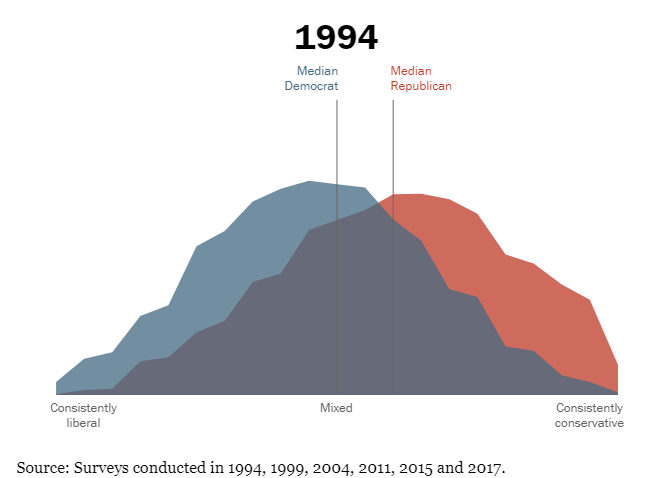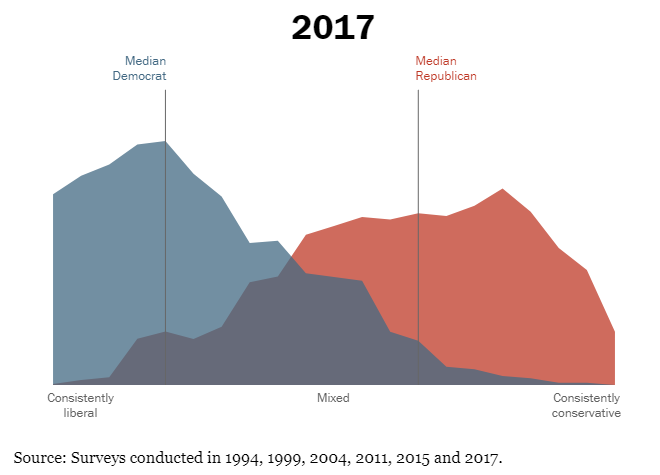A year ago, the “experts” were shocked when Donald Trump won the electoral vote for President. Since that time we’ve seen an already divided country become even more divided. We seem to have entered a phase in our social cycle where a large majority of people believe their way is the only way to proceed. Anybody that disagrees is insulted or worse. I’ve heard people say, “it’s politics. It’s always been that way.” That is simply not true. Last weekend I saw a fascinating tool put out by Pew Research showing the change in the political spectrum for the average American in each party. When the Baby-boom generation took over control of Congress in 1994, the two parties were both near the middle of the political spectrum. Since then it has grown increasingly wider.
Click here for the Political Polarization Interactive Tool
This tool allows you to flip through the different years to see how our country has evolved over the past 23 years (in my opinion devolved). Even in 2004 the country was mostly moderate. From 2004 to 2011 we saw the Republicans push significantly towards the right of the political scale, while Democrats remained where they were. From 2011 to 2015 we saw the Democrats make a bigger move left, while Republicans pushed a bit further right. Then from 2015 to 2017 we saw an astounding push from Democrats to go even further to the left.


This shift has left very little room for any middle ground. If this continues things will only get uglier. I’ve often argued the internet, and in particular social media has made our country much less educated and more divided. 24 hour “news” channels that cater to specific parties have only helped cement people’s beliefs. As humans we are prone to “confirmation bias” (only seeking data from those that agree with our viewpoints). The “information age” has only fed into those biases.
The good news is the social and generational cycle is not linear. The portion of the Social Cycle the Baby-boom generation represents is the “Ideological” generation. Their cohorts throughout history have been described as being deeply dug into their political and personal beliefs with little willingness to compromise. Younger generations tend to not repeat the mistakes made by the older generations. They see the problems their parents created and strive to fix them for their own future’s sake. Most surveys show Generation X & the Millennial Generation — those in line to take over leadership positions in the next 5-10 years are much more aligned in the middle.
Despite the negative view of the older generations on the younger ones (this has been going on since the beginning of time), there are some key traits inside the Gen X & Millennial Generations that will be critical to solving our longer-term problems. Gen X’s cohorts in history are describe as “Adaptive”, while the Millennials align with past “Hero” generations. During the last “Crisis” stage of the Social Cycle, the Adaptive Generation (labeled the “Lost Generation” became the military and political leaders during World War II and the recovery. The “Heroes” were the GI Generation. As teens and young adults, both were heavily criticized by the Ideological Generation that brought both the Roaring 20’s and the subsequent Great Depression. The aging Ideologicals (the “Missionary Generation” had become dug into their ways and refused to compromise with anybody.
It wasn’t until Americans realized they had to change directions quickly and began throwing out the leaders who brought us into the Crisis that America found a way to turn things around and led to the rapid Recovery phase (which ushered in the Baby-boom generation). How long will it take this time before Americans realize the Ideological strong-hold the Baby-boom generation has placed on our country is destroying us from within? If history is any guide, it could get worse before people start to look for new leadership. Be prepared.
Note: Most of our clients and many of our advisors are from the Baby-boom generation. Just as I am not the “typical” Gen Xer, nor are many of the people we work with from the Millennial generation the “typical” Millennial, I’d venture to say less than 1% of our Baby-boom clients or advisors are “typical” Baby-boomers. The very fact you’ve saved money for the future and not spent everything you had makes you an a-typical Baby-boomer. Many have been business owners and understand the value of capitalism and that there are far more grey areas than black and white answers, meaning they also are so in-grained with one political viewpoint they are unwilling to listen to a logical argument that might disagree with them. In pretty much every client and advisor meeting, regardless of the age or party affiliation of the person sitting across the table, they agree — our country cannot continue down the path we are heading and if we don’t change soon we are all in trouble.
The vast majority of the clients and advisors I meet with identify as Republicans, but I think most are not the “ideological” type. They are simply trying to fight the rapidly growing idelogicals on the left. Look again at the 2017 chart — there are far more Democrats than Republicans now. The only way for the Republicans to fight this is to attract more of the “mixed” group in the middle. Instead, the idelogicals leading the Republican party seem bound and determined to shift even further to the right, alienating those in the middle.

This article was not meant to offend anybody, but to simply open up our minds to the fact our country has not always been this divided. The longer we continue pushing to the two sides of the political spectrum, the worse off we will be. History has proven that. Please share this on social media and let’s start opening everyone’s eyes before it’s too late.
Additional note: I was going back through past blogs and noted I’ve talked a great deal about the symptoms of the Social Cycle, but have not ever completed a project I’ve been working on the past 5 years — putting my study of the social & demographic cycles and what it means for our future into something that is easily digestible. For now, if you’re interested I would encourage you to start with Neil Howe’s book, Generations: The History of America’s Future.




